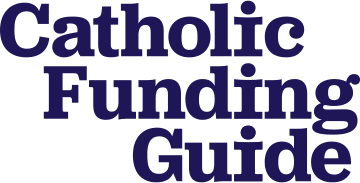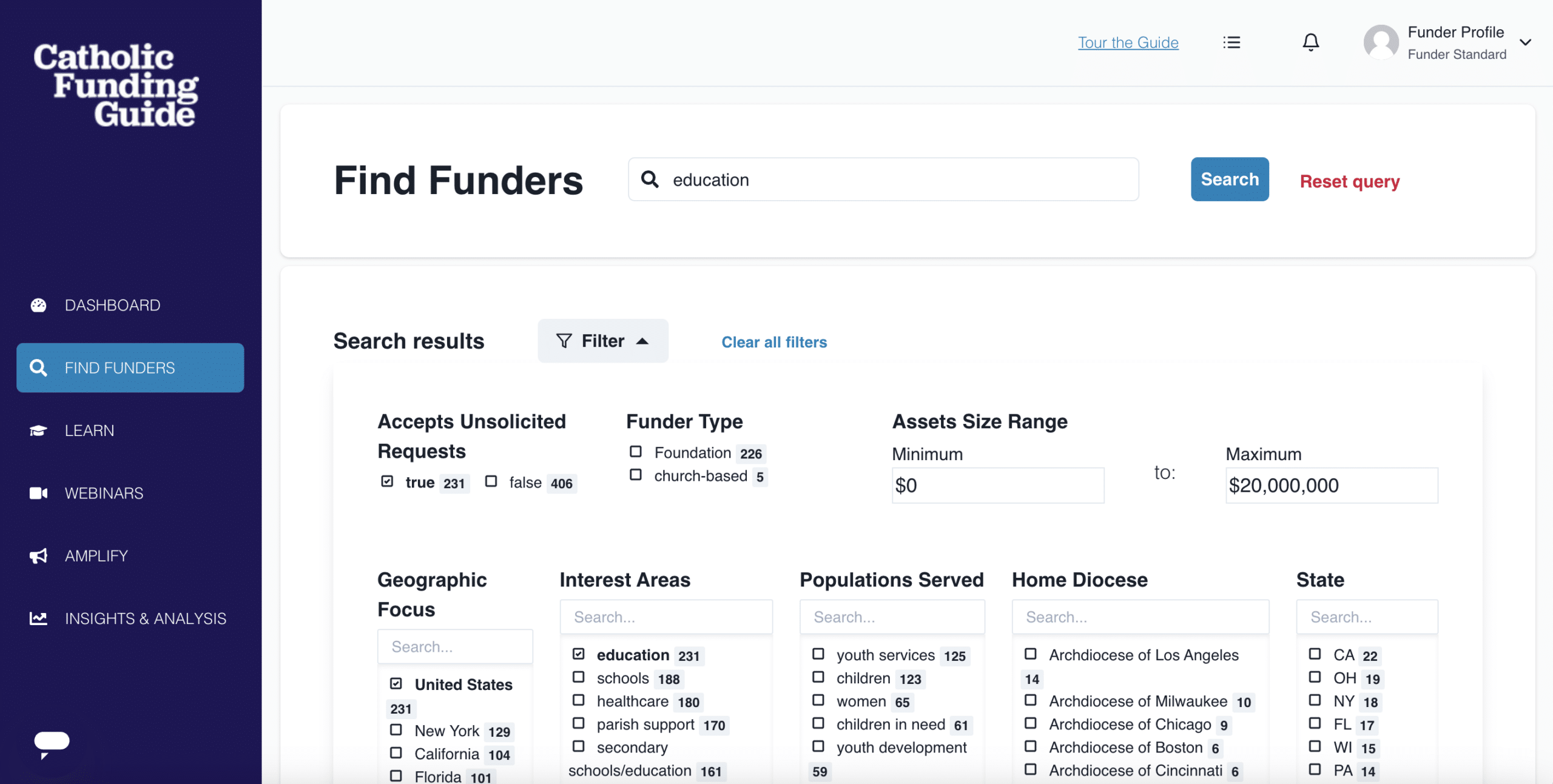The word “proposal” refers to two common definitions: one is a suggested plan for consideration, while the other is an offer of marriage, or partnership. Catholic organizations may benefit from focusing on both versions of the definition, since Catholic funders consider their grantees as partners in leading positive change. This mindset may be helpful to nonprofits as they shift their thinking about grant proposals from a purely financial perspective to one of authentic interest in acquiring a partner in mission.
How Catholic funders differ from other funders
According to the Faith & Organizations Project, a significant challenge for Catholic fundraising is the prevailing assumption (even among Catholics) that all Catholic organizations are funded by the local Catholic diocese, or even the Catholic Church at large. Unfortunately, the reality that many Catholic organizations face is that the financial support from religious sponsors, including dioceses, parishes and religious orders continues to decline.
Catholic foundations and funders are aware of the challenges of Catholic ministries, and often help to offset the financial strain from decreased support from Church institutions. However, foundations must mitigate their own challenges as their grant-making budgets are tied to endowments that rise and fall according to the global economy. For this reason, grant-makers are not always able to respond to financial needs at the level that is requested, or at the scale that they would prefer to respond.
Funders that support Catholic programs are as unique and diverse as the U.S. Catholic population. Some funders restrict their support exclusively to Catholic organizations, while other funders include Catholic organizations among their areas of support. Some funders may only support causes within their local diocese, while others support national and international causes.
Benefits of working with a Catholic funder include:
- Most Catholic funders will support religiously-oriented programs that other foundations do not fund, such as programs within a parish or Catholic school, spiritual retreats, training for religious vocations, programs for or operated by religious orders, etc.
- Most Catholic funders understand and support Catholic social teaching and have at least a basic level of understanding of the most pressing social issues.
Some unique dimensions of working with a Catholic funder may include:
- Some funders may limit funding to Catholic organizations specifically listed in the The Official Catholic Directory;
- Many Catholic funders have grant guidelines that require that funded programs do not violate fundamental Catholic Church tenets and align with Catholic social teaching;
- Some funders may support Catholic programs with the stipulation that people of other faiths are not denied services.
Before you propose
A few helpful steps to consider before you begin drafting the grant proposal include:
- Review and update all online profiles for your organization. In today’s information-rich society, online research fuels decision-making at many levels – including donors and funders. It’s important to verify that the information you plan to share in the grant proposal is consistent with the information on your organization’s website, as well as any other public profiles your organization may have through GuideStar.org, GreatNonprofits.org, CharityNavigator.org, or others.

- status as well as other financial documents as part of the grant request process. To prevent any delays in the process when you are ready to submit the proposal, gather these documents in advance:
- Letter from IRS confirming 501c3 status
- Organization’s operating budget
- Budget for program related to funding request
- IRS 990 forms for the most recent 1-2 years
- Most recent financial audit
- List of board members
- Resumés of key staff related to program
- Consider learning opportunities. Some funders provide online resources for grant seekers and/or capacity building workshops to provide coaching on grant writing. For example, The Assisi Foundation of Memphis, Inc. provides a downloadable “Grantseeker Resource Packet” for organizations; as well as a 12-session educational series for first-time grant applicants. The Catholic Community Foundation of Minnesota provides a downloadable “Grantseeker’s Guidebook.” Other foundations, such as the Sisters of Charity Foundation of South Carolina, provide a recorded webinar for organizations to review prior to initiating a funding request.
- Meet with key staff. Whether you are the program director or a grant writer indirectly involved with the program, it is usually helpful to consult with other team members involved with the program to gather all the information needed to draft the narrative of the grant proposal. Depending on the size of the organization and program, it may be helpful to meet with the organization’s finance director and program directors as well as staff who are directly delivering the service. Use the items listed below in the “Collect the content” section as a framework for your meetings.
- Establish a process timeline. Once you have determined the information you need from your colleagues, establish internal deadlines for each contributor that help you to reach the goal of submitting the proposal before the deadline.
Drafting the grant proposal
While a large share of the content you develop for a grant proposal may form the basis of many proposals for multiple foundations, keep in mind that the concept of “one size fits all” does not apply to grant writing. Every proposal should be customized for each specific funder and should clearly connect the funder’s mission and grant-making priorities with your organization’s mission and services.
Review the process
- Carefully review the funder’s profile on the Catholic Funding Guide, as well as the funder’s website to ensure an understanding of all eligibility guidelines, funding limitations, process steps, and timelines.
- “Common app” or customized? Some funders, such as the Connelly Foundation, utilize a “common application” form that may be shared within a region or network of funders, while others require their own customized forms. In any case, it is critical that instructions are clearly followed.
- Online application cautions: Many funders utilize an online application process which may or may not allow the applicant to save information during the process of completing the form. When possible, check funder websites for sample grant applications that may be used to draft responses offline before completing the form online.
Collect the content
The development of your grant proposal will progress more smoothly if you take the time to gather and organize key resources in advance. Most grant applications require these components:
- Organizational narrative – describes the mission, purpose and brief history of the organization.
- Program narrative – describes the opportunity or need that your program is addressing and how it is addressing the need or opportunity.
- Evaluation – describes the desired outcomes of the program and how they are measured within a specific period of time. This section may include a description of past successes with the program as well as the anticipated impact that would be accomplished with grant support in the future. It is important to avoid over-promising results for anticipated outcomes. Very few programs result in 100% effectiveness.
- Budget – provides the organizational budget, the total budget for the program requesting funding, and a description for how the grant award would be used. Foundations may request a list of other grants your organization has received and/or requested.
Determine the dollar amount
As a general rule, most funders prefer to fund only a portion of a program’s budget, and some funders specify the actual percentage they are willing to fund. To ensure the requested amount falls within the funder’s usual range, review the funder’s past grant activity through the funder’s profile in the Catholic Funding Guide, the funder’s website, and/or their past 990 forms to explore the types of grants awarded and the associated dollar amounts.
Write the proposal
A few important tips to consider when you are writing the grant proposal include:

- Be clear and concise. After you complete the first draft, review to determine if any information has been duplicated or if any information may be shortened without altering the meaning. Do not provide volumes of information beyond the requested requirements.
- Write for an audience outside your sector. Have someone outside your program area review the draft to make sure all of the content is understandable to someone who is not familiar with the topic. To strengthen the comprehension of your narrative, avoid industry-based jargon or acronyms that may not be familiar to people outside your industry or geographic area.
- Allow twice as much time as you think you need. The time needed to complete the grant proposal may correlate with your level of experience in grant writing and with the number of people who need to be included in the review process. Several cycles of revisions may be needed in order to fine-tune the proposal.
- Plan to submit the proposal early. Set internal deadlines for information collection and staff reviews that lead toward the proposal’s completion at least one day before the submission deadline. This requires clear communication of the timeline among the staff so all involved parties are aware of their responsibilities and internal deadlines. As a former program officer for a Catholic foundation, I witnessed many avoidable last-minute barriers to timely submissions. I also observed how some grant requests were declined due to incomplete information or sloppy errors – which are often symptoms of rushed work.
Remember that the grant proposal is a formal invitation from your organization to the funder to become a partner in mission. Since partnerships are built on trust, it is critical that both partners fulfill their responsibilities as expected – beginning with a timely submission of the grant proposal.
A proposal for positive change
While most funders and foundations consider funding requests as opportunities to support the philanthropic causes they support, Catholic funders also look for opportunities to advance the broader mission of the Catholic Church through faith-filled stewardship. This awareness provides Catholic organizations with the opportunity to approach grant writing through a spiritual, mission-focused purpose, rather than limiting the activity to a transactional purpose for financial gain.
The Catholic Funding Guide serves as a vital tool in identifying the funders who are as passionate about your cause as you are. Your grant proposal should be developed with this faith-filled, passionate, prospective partner in mind – as an invitation for them to join you on the journey of contributing to human flourishing in a healthy, sustainable world.



